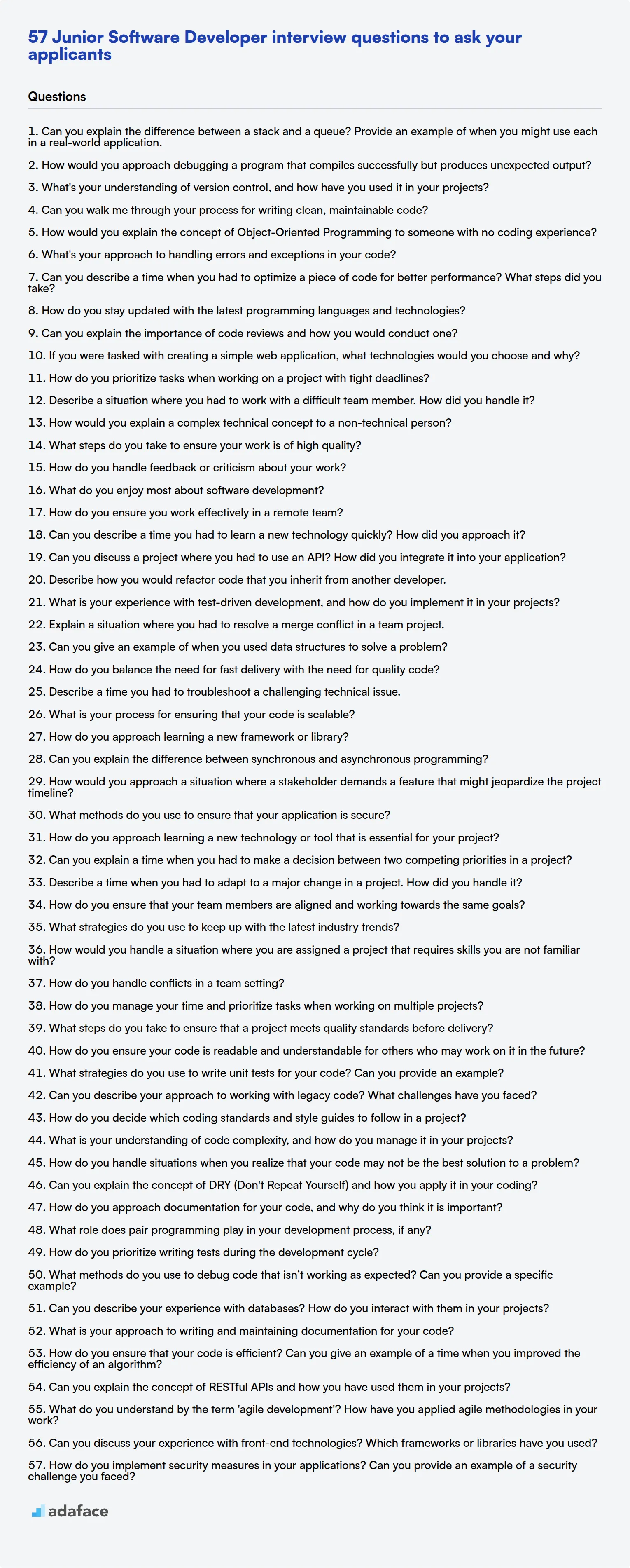Hiring the right junior software developer can be a game-changer for your team's productivity and growth. Asking the right interview questions is crucial to assess a candidate's technical skills, problem-solving abilities, and cultural fit.
This blog post provides a comprehensive list of interview questions for junior software developers, ranging from basic to advanced. We cover common questions, coding practices, technical skills, and more to help you evaluate candidates effectively.
By using these questions, you can make informed hiring decisions and build a strong development team. Consider complementing your interview process with pre-employment assessments to get a well-rounded view of candidates' capabilities.
Table of contents
10 common Junior Software Developer interview questions to ask your candidates
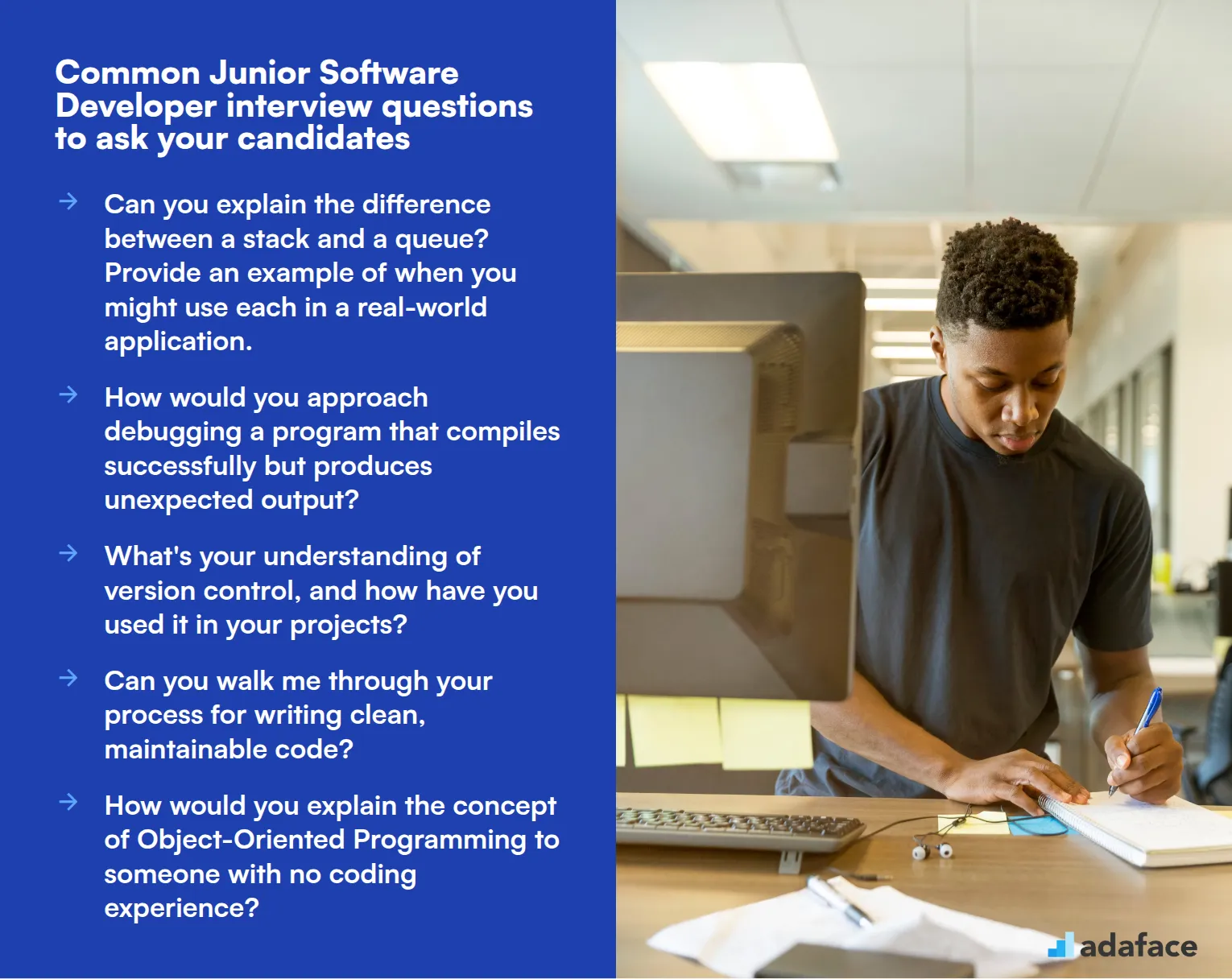
To assess the technical competence and problem-solving abilities of your junior software developer candidates, consider using these 10 interview questions. These questions are designed to evaluate both theoretical knowledge and practical skills, helping you identify the most promising candidates for your team.
- Can you explain the difference between a stack and a queue? Provide an example of when you might use each in a real-world application.
- How would you approach debugging a program that compiles successfully but produces unexpected output?
- What's your understanding of version control, and how have you used it in your projects?
- Can you walk me through your process for writing clean, maintainable code?
- How would you explain the concept of Object-Oriented Programming to someone with no coding experience?
- What's your approach to handling errors and exceptions in your code?
- Can you describe a time when you had to optimize a piece of code for better performance? What steps did you take?
- How do you stay updated with the latest programming languages and technologies?
- Can you explain the importance of code reviews and how you would conduct one?
- If you were tasked with creating a simple web application, what technologies would you choose and why?
8 Junior Software Developer interview questions and answers to evaluate junior developers
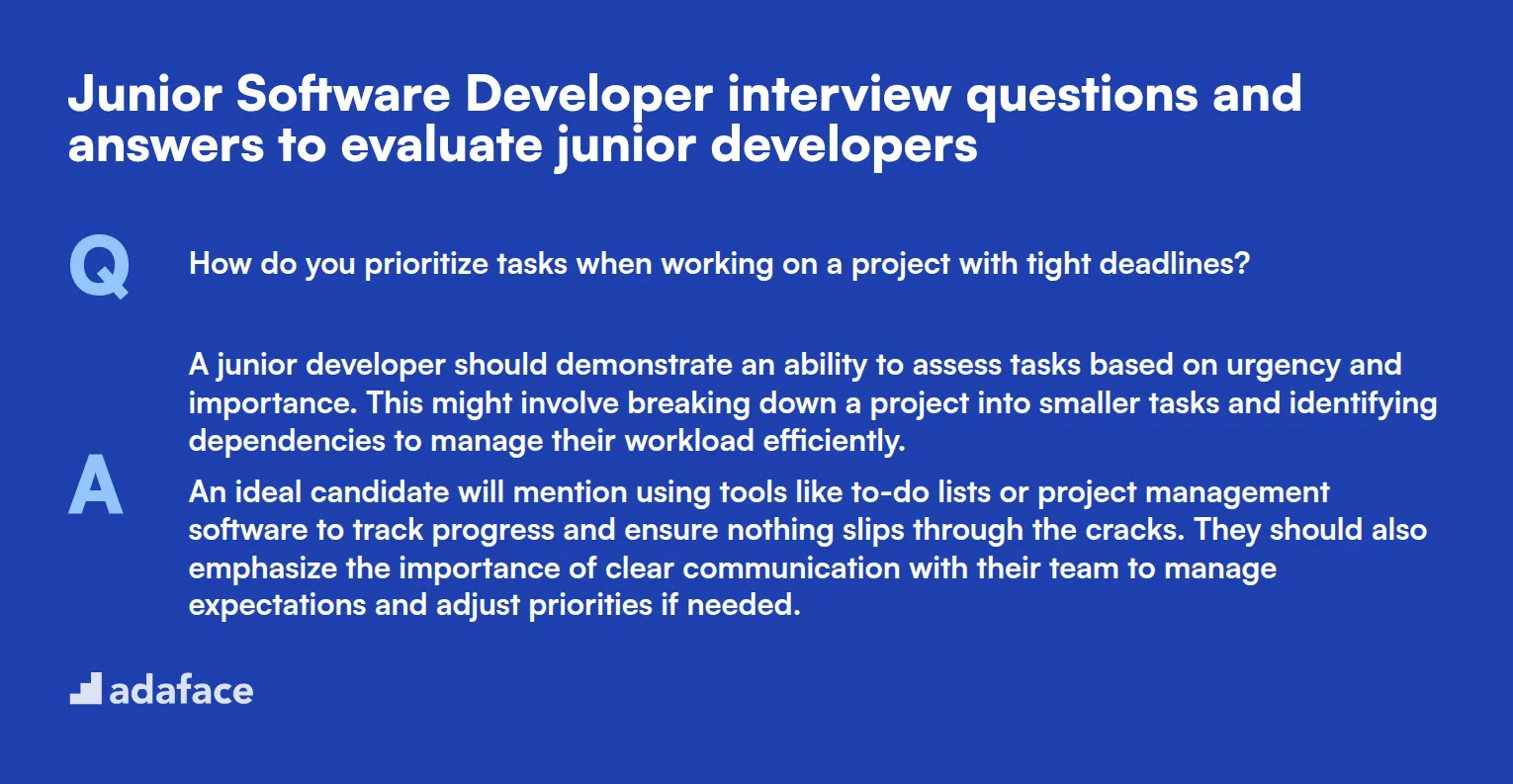
When interviewing junior software developers, it's important to dig deeper than just their technical skills. Our curated list of interview questions helps you assess not only their understanding of fundamental concepts but also their problem-solving mindset and ability to communicate effectively. Whether you're a seasoned recruiter or a hiring manager, these questions will guide you in identifying the right fit for your team.
1. How do you prioritize tasks when working on a project with tight deadlines?
A junior developer should demonstrate an ability to assess tasks based on urgency and importance. This might involve breaking down a project into smaller tasks and identifying dependencies to manage their workload efficiently.
An ideal candidate will mention using tools like to-do lists or project management software to track progress and ensure nothing slips through the cracks. They should also emphasize the importance of clear communication with their team to manage expectations and adjust priorities if needed.
2. Describe a situation where you had to work with a difficult team member. How did you handle it?
Handling difficult team dynamics is a crucial skill for any developer. The candidate might describe a scenario where they actively listened to the team member's concerns and tried to find a common ground. They should emphasize maintaining professionalism and focusing on the project goals.
Look for candidates who express empathy and demonstrate conflict-resolution skills. They should show they are open to feedback and willing to adapt their approach to maintain a collaborative work environment.
3. How would you explain a complex technical concept to a non-technical person?
The candidate should aim to simplify the concept using analogies or everyday language. For example, explaining how a website works by comparing it to a storefront, where the server is the stockroom and the browser is the front counter.
Candidates who excel in this question will demonstrate patience and the ability to gauge the listener's level of understanding, adjusting their explanation as needed. This skill is vital for effective cross-team collaboration and client communication.
4. What steps do you take to ensure your work is of high quality?
Candidates should mention strategies like double-checking their work, peer reviews, and testing their code thoroughly. They might also discuss using tools that help maintain code quality, such as linters or automated testing frameworks.
An ideal candidate will emphasize the importance of learning from mistakes and continuously improving their skills. They should show a proactive approach to quality assurance and personal development.
5. How do you handle feedback or criticism about your work?
A strong candidate will express a positive attitude towards feedback, viewing it as a learning opportunity. They might describe a situation where they received constructive criticism and how they used it to improve their work or approach.
Look for candidates who demonstrate a growth mindset and the ability to separate personal feelings from professional feedback. Those who actively seek feedback are often more adaptable and open to learning.
6. What do you enjoy most about software development?
Passionate developers might talk about the creative problem-solving aspect, the satisfaction of building something from scratch, or the continuous learning opportunities in the field. Some may highlight the joy of seeing their work positively impact users.
Candidates who can articulate their passion for software development and link it to specific experiences or projects are likely to be more engaged and motivated in their roles.
7. How do you ensure you work effectively in a remote team?
Effective remote work requires clear communication and time management skills. Candidates might discuss setting clear goals, using collaboration tools like Slack or Zoom, and maintaining regular check-ins with their team.
An ideal candidate will emphasize the importance of self-discipline and proactive communication to overcome the challenges of remote work. Adaptability and a strong sense of responsibility are key traits to look for.
8. Can you describe a time you had to learn a new technology quickly? How did you approach it?
Learning new technologies is a common requirement in software development. Candidates should describe their learning process, which might include researching online resources, taking courses, or seeking mentorship from experienced colleagues.
Look for candidates who show initiative and resourcefulness in their learning process. Those who can demonstrate a structured approach to acquiring new skills tend to adapt better to the fast-paced changes in technology.
12 intermediate Junior Software Developer interview questions and answers to ask mid-tier developers.
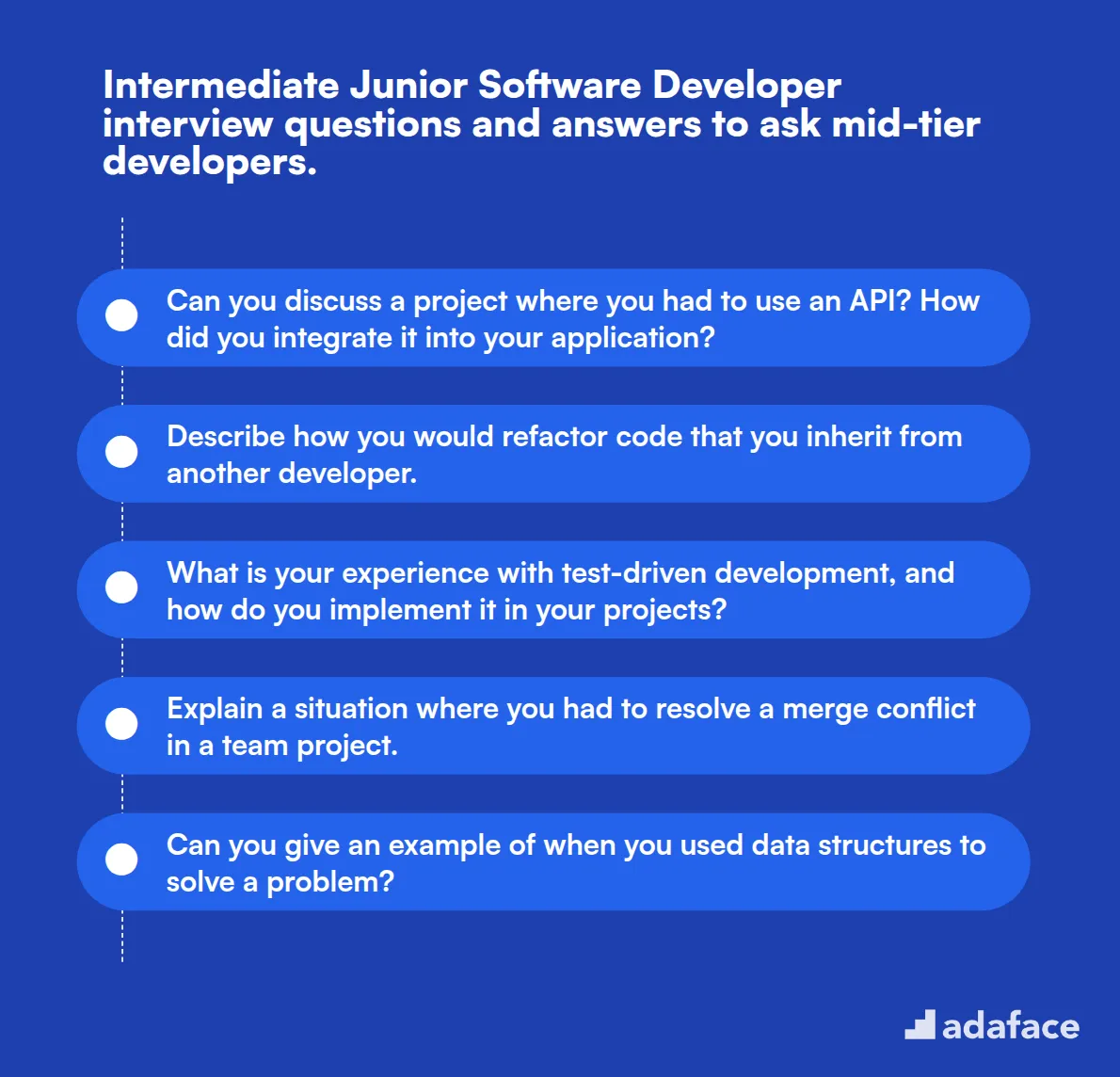
To assess if candidates have the necessary skills and understanding for a junior software developer role, consider these intermediate interview questions. Tailored for mid-tier developers, this list will help you gauge technical competence and problem-solving abilities effectively.
- Can you discuss a project where you had to use an API? How did you integrate it into your application?
- Describe how you would refactor code that you inherit from another developer.
- What is your experience with test-driven development, and how do you implement it in your projects?
- Explain a situation where you had to resolve a merge conflict in a team project.
- Can you give an example of when you used data structures to solve a problem?
- How do you balance the need for fast delivery with the need for quality code?
- Describe a time you had to troubleshoot a challenging technical issue.
- What is your process for ensuring that your code is scalable?
- How do you approach learning a new framework or library?
- Can you explain the difference between synchronous and asynchronous programming?
- How would you approach a situation where a stakeholder demands a feature that might jeopardize the project timeline?
- What methods do you use to ensure that your application is secure?
9 advanced Junior Software Developer interview questions and answers to evaluate senior developers
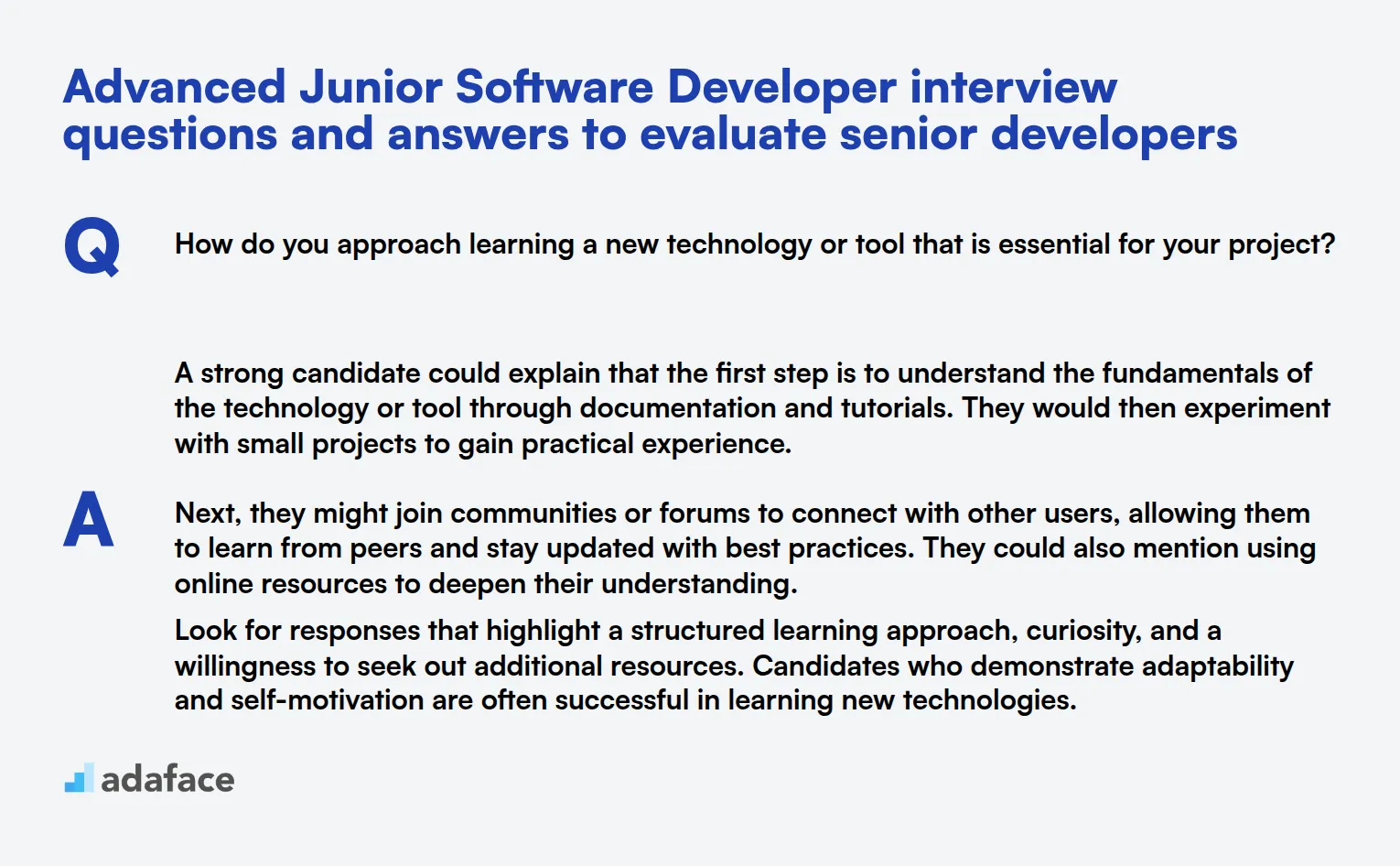
When you're ready to separate the wheat from the chaff in your junior software developer interviews, this list of advanced questions will help you identify those hidden gems that might just be your next senior developers. Use these questions to gauge not just technical knowledge, but problem-solving abilities and cultural fit as well.
1. How do you approach learning a new technology or tool that is essential for your project?
A strong candidate could explain that the first step is to understand the fundamentals of the technology or tool through documentation and tutorials. They would then experiment with small projects to gain practical experience.
Next, they might join communities or forums to connect with other users, allowing them to learn from peers and stay updated with best practices. They could also mention using online resources to deepen their understanding.
Look for responses that highlight a structured learning approach, curiosity, and a willingness to seek out additional resources. Candidates who demonstrate adaptability and self-motivation are often successful in learning new technologies.
2. Can you explain a time when you had to make a decision between two competing priorities in a project?
An ideal response would describe a situation where the candidate had to weigh the pros and cons of each priority, considering factors like deadlines, available resources, and project impact.
They might mention consulting with team members or stakeholders to gather diverse perspectives before making an informed decision.
Watch for candidates who demonstrate critical thinking and effective decision-making skills. Their ability to prioritize effectively is crucial for managing multiple tasks in a fast-paced environment.
3. Describe a time when you had to adapt to a major change in a project. How did you handle it?
A candidate could describe how they initially assessed the impact of the change on the project timeline, resources, and deliverables. They might have held discussions with the team to realign on goals.
They could explain that they prioritized tasks and adjusted workflows to accommodate the change, ensuring minimal disruption to the project.
Look for answers that reflect flexibility, resilience, and effective communication. The ability to adapt to change is essential for thriving in the dynamic field of software development.
4. How do you ensure that your team members are aligned and working towards the same goals?
Candidates might discuss the importance of regular meetings to discuss progress, share updates, and address any challenges or blockers the team is facing.
They could also mention setting up clear goals and expectations at the start of the project, ensuring everyone understands their roles and responsibilities.
Strong candidates would emphasize the importance of open communication and collaboration. Their ability to maintain team alignment contributes to the successful execution of projects.
5. What strategies do you use to keep up with the latest industry trends?
An ideal candidate would describe a combination of approaches, such as following industry blogs, attending webinars, or participating in online courses.
They might also mention engaging with professional communities or attending conferences to network with peers and gain insights into emerging trends.
Look for candidates who demonstrate a proactive approach to continuous learning and an enthusiasm for staying informed about industry developments.
6. How would you handle a situation where you are assigned a project that requires skills you are not familiar with?
A candidate might explain that they would start by identifying the key skills needed and then seeking out resources to quickly get up to speed, such as online tutorials or training sessions.
They could also mention seeking guidance from more experienced colleagues or mentors and collaborating with team members who have the necessary expertise.
Candidates who exhibit a willingness to learn and seek help when needed are often successful in quickly adapting to new challenges. Look for responses that highlight resourcefulness and teamwork.
7. How do you handle conflicts in a team setting?
An ideal response would involve actively listening to all parties involved to understand the root cause of the conflict. The candidate might then facilitate a discussion to find a mutually agreeable solution.
They could mention promoting a culture of open communication where team members feel safe to express their concerns and collaborate on finding resolutions.
Look for candidates who show strong interpersonal skills, empathy, and the ability to mediate effectively. Their conflict resolution skills are crucial for maintaining a harmonious team environment.
8. How do you manage your time and prioritize tasks when working on multiple projects?
Candidates might discuss using tools like task lists, calendars, or project management software to organize their tasks and deadlines effectively.
They could explain the importance of setting clear priorities, breaking down projects into manageable tasks, and regularly reviewing progress to adjust plans as needed.
Look for responses that demonstrate strong organizational skills and the ability to prioritize effectively. Time management is key to successfully juggling multiple responsibilities.
9. What steps do you take to ensure that a project meets quality standards before delivery?
An ideal candidate would describe a thorough testing process, including unit tests, integration tests, and user acceptance testing, to identify and address any defects or issues.
They might also mention conducting code reviews and seeking feedback from peers to ensure the final product meets quality and performance standards.
Look for a commitment to quality and attention to detail in their response. Candidates who emphasize a methodical approach to testing and review often produce high-quality work.
10 Junior Software Developer interview questions about coding practices
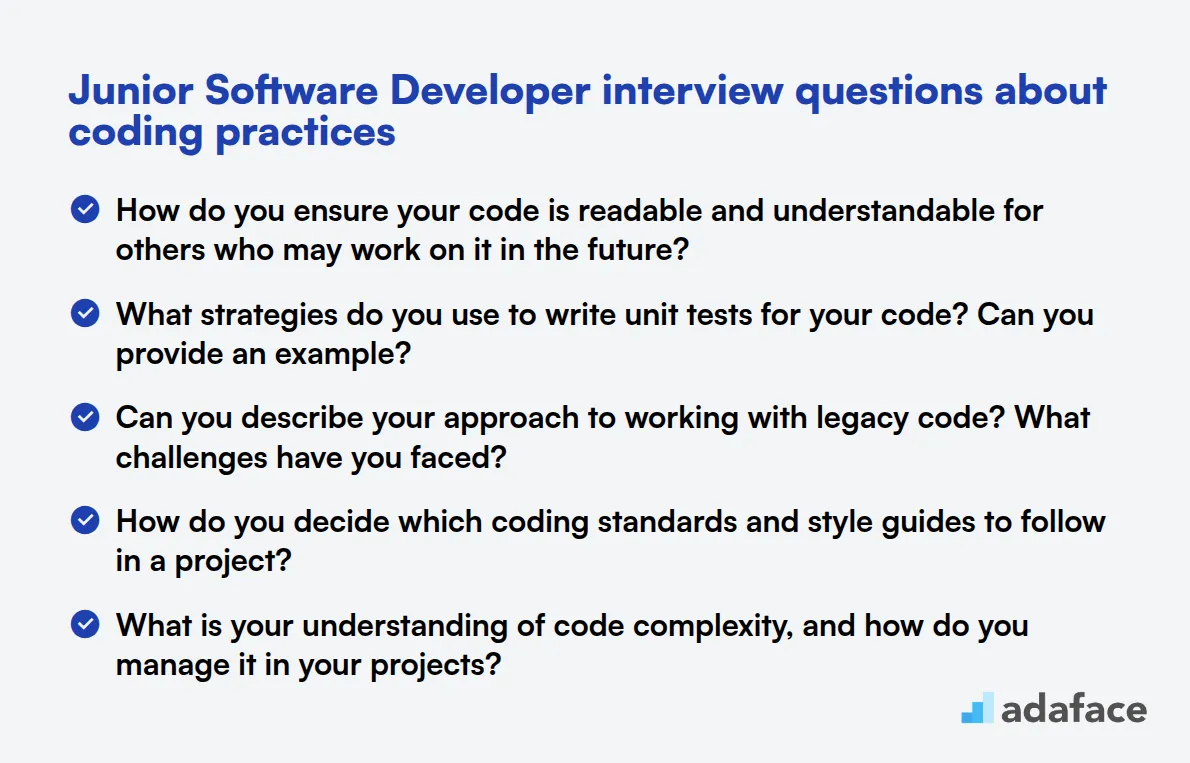
To gauge a candidate's coding practices effectively, using these targeted questions can help reveal their thought process and problem-solving abilities. Incorporate them into your interview to thoroughly assess if the junior software developer aligns with your team's needs. For more details on the role, check out this job description.
- How do you ensure your code is readable and understandable for others who may work on it in the future?
- What strategies do you use to write unit tests for your code? Can you provide an example?
- Can you describe your approach to working with legacy code? What challenges have you faced?
- How do you decide which coding standards and style guides to follow in a project?
- What is your understanding of code complexity, and how do you manage it in your projects?
- How do you handle situations when you realize that your code may not be the best solution to a problem?
- Can you explain the concept of DRY (Don't Repeat Yourself) and how you apply it in your coding?
- How do you approach documentation for your code, and why do you think it is important?
- What role does pair programming play in your development process, if any?
- How do you prioritize writing tests during the development cycle?
8 Junior Software Developer interview questions about technical skills
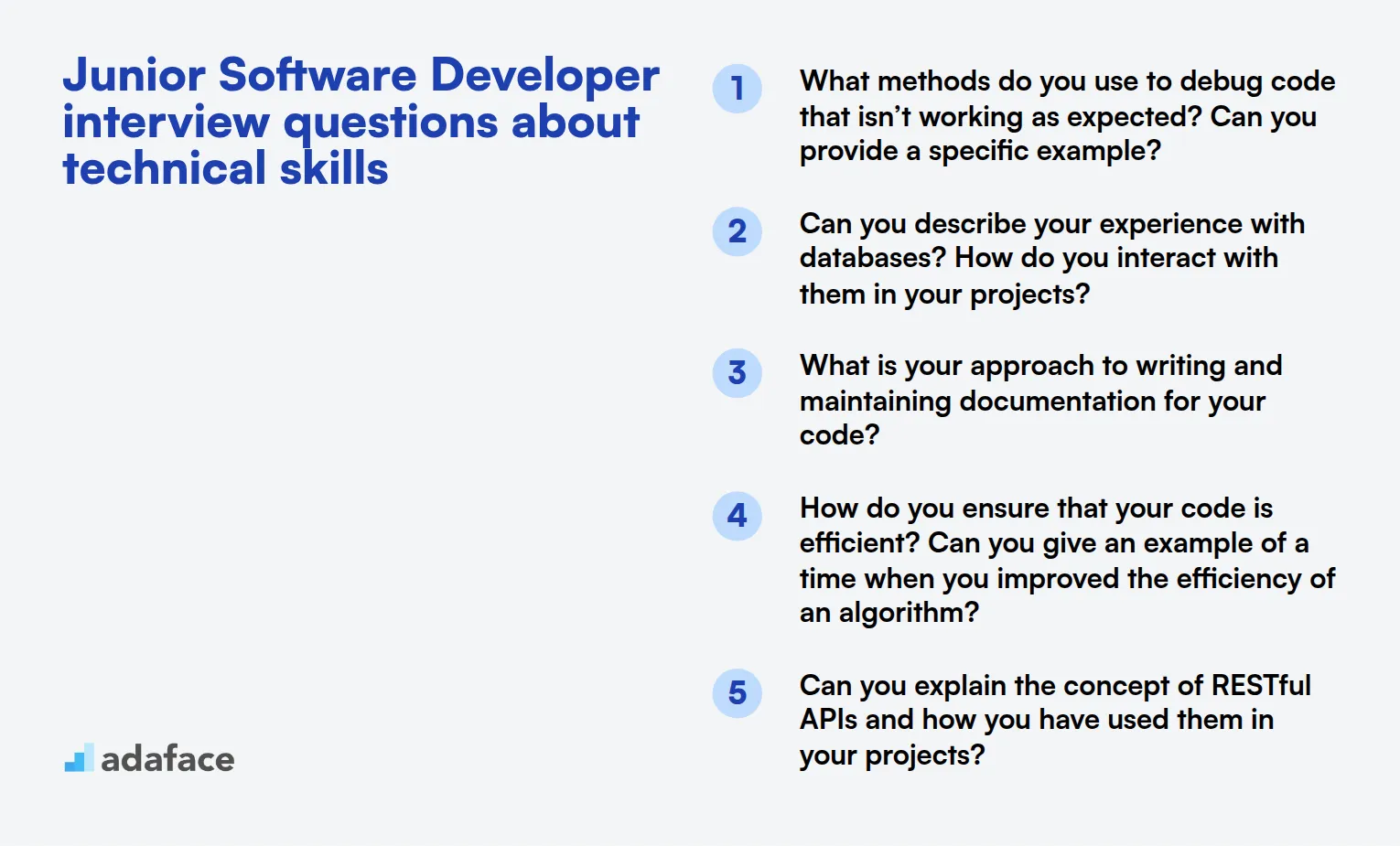
To assess whether candidates possess the essential technical skills needed for a Junior Software Developer role, utilize this list of targeted questions. These inquiries can help you gauge their understanding and problem-solving abilities in practical scenarios, making your interview process more effective. For a comprehensive overview, consider reviewing the Junior Software Developer job description.
- What methods do you use to debug code that isn’t working as expected? Can you provide a specific example?
- Can you describe your experience with databases? How do you interact with them in your projects?
- What is your approach to writing and maintaining documentation for your code?
- How do you ensure that your code is efficient? Can you give an example of a time when you improved the efficiency of an algorithm?
- Can you explain the concept of RESTful APIs and how you have used them in your projects?
- What do you understand by the term 'agile development'? How have you applied agile methodologies in your work?
- Can you discuss your experience with front-end technologies? Which frameworks or libraries have you used?
- How do you implement security measures in your applications? Can you provide an example of a security challenge you faced?
Which Junior Software Developer skills should you evaluate during the interview phase?
While it's impossible to assess every aspect of a candidate's potential in a single interview, certain skills stand out as essential for junior software developers. Evaluating these core competencies can help determine if a candidate is a good fit for your team and the challenges ahead.
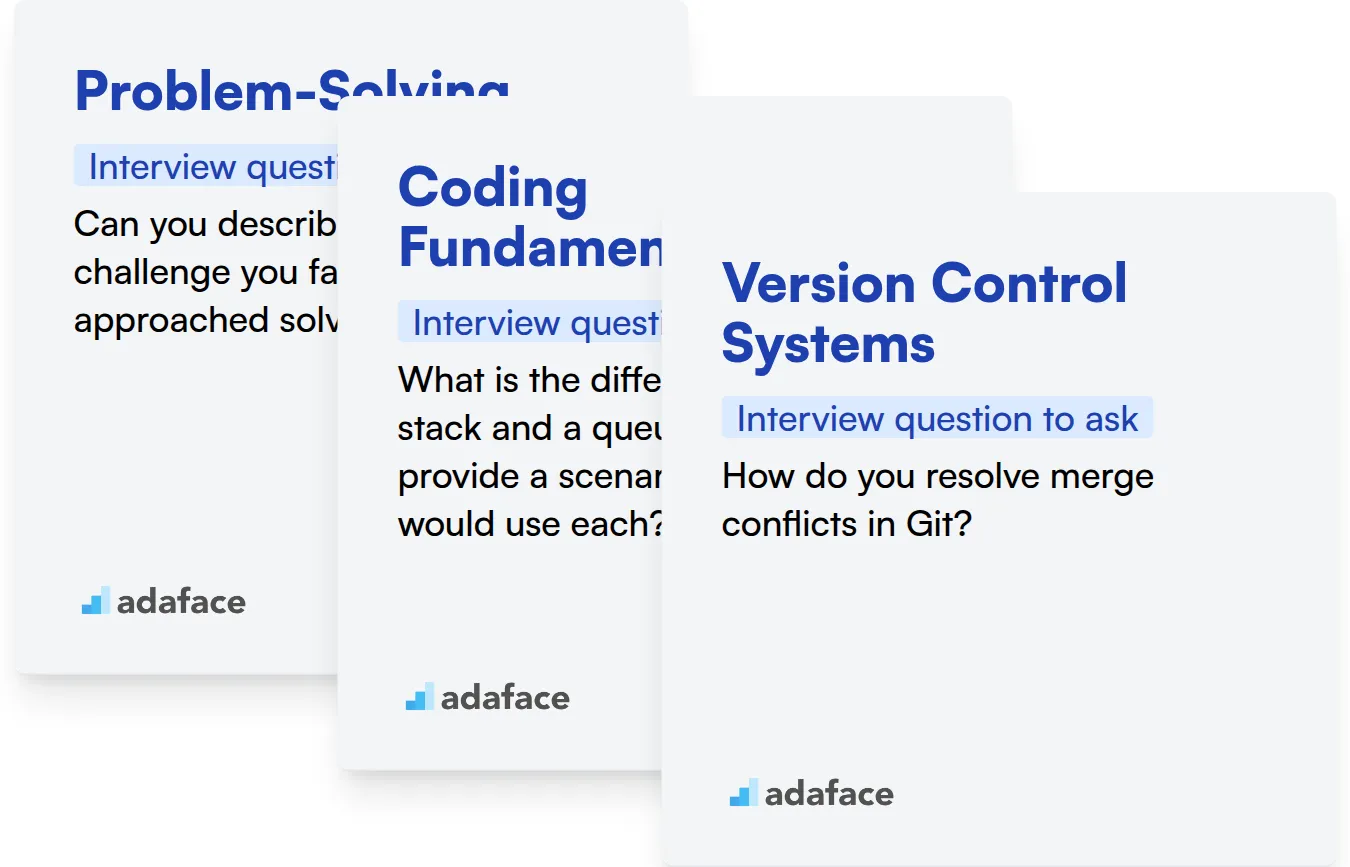
Problem-Solving
To gauge a candidate's problem-solving ability, consider using an assessment that includes relevant multiple-choice questions. For instance, our Technical Aptitude test offers a diverse set of questions that can help filter candidates based on their problem-solving skills.
In addition to assessments, you can gain insights by asking targeted interview questions. One effective question to ask is:
Can you describe a technical challenge you faced and how you approached solving it?
When candidates respond, look for clarity in their thought process and the steps they took to resolve the issue. Pay attention to whether they demonstrate self-reflection and learning from their experiences, as this can indicate their growth mindset.
Coding Fundamentals
Utilizing an online coding assessment, such as our Coding test, can help identify candidates with strong coding fundamentals. Multiple-choice questions can effectively evaluate their theoretical knowledge and practical application.
You can also ask specific questions during the interview process to assess coding fundamentals. A good question to consider is:
What is the difference between a stack and a queue, and can you provide a scenario where you would use each?
Listen for their understanding of these data structures, along with how they articulate real-world applications. A well-rounded answer can demonstrate their foundational knowledge and practical insight.
Version Control Systems
To evaluate a candidate's knowledge of version control, consider using a test that includes related questions. For example, our Git test offers scenarios and questions that can help assess their familiarity with version control practices.
Another way to gauge their understanding is by asking a targeted question. You might ask:
How do you resolve merge conflicts in Git?
When they answer, observe whether they discuss specific strategies or tools they use to handle conflicts effectively. Their response can indicate their hands-on experience with version control.
Hire Top Talent with JavaScript Skills Tests and Interview Questions
If you're looking to hire someone with JavaScript skills, it's important to ensure they possess the right technical abilities. Verifying these skills accurately is key to building a strong development team.
One effective way to assess the skills of candidates is through skill tests. Consider using the Adaface JavaScript Online Test to gauge their proficiency.
Once candidates have taken the test, you'll be able to shortlist the best applicants. This allows you to focus your interview efforts on those who have demonstrated their abilities.
To move forward, you can sign up through our Adaface Dashboard to explore more about our offerings and start enhancing your hiring process.
C# .NET Junior Developer Test
Download Junior Software Developer interview questions template in multiple formats
Junior Software Developer Interview Questions FAQs
Look for basic programming knowledge, problem-solving abilities, familiarity with version control systems, and a willingness to learn and adapt to new technologies.
Ask them to solve simple coding problems, explain their thought process, and discuss their approach to debugging and testing code.
Look for good communication skills, teamwork abilities, curiosity, and a passion for continuous learning and improvement.
Ask about their learning strategies, side projects, and how they stay updated with industry trends and new technologies.

40 min skill tests.
No trick questions.
Accurate shortlisting.
We make it easy for you to find the best candidates in your pipeline with a 40 min skills test.
Try for freeRelated posts
Free resources




